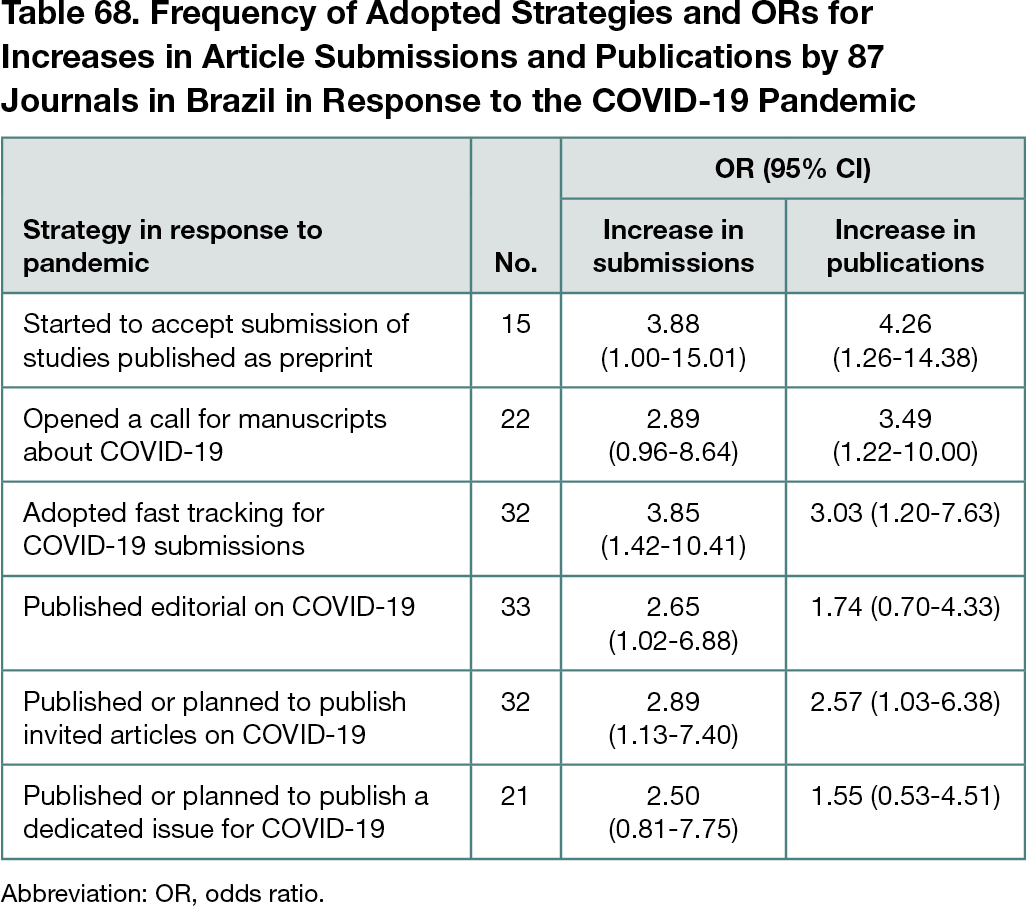Abstract
Brazilian Researchers and Journal Editors Experiences With Scientific Publication During the COVID-19 Pandemic
Luísa von Zuben Veçoso,1 Marcus Tolentino Silva,2 Taís Freire Galvão1
Objective
To assess whether strategies adopted by Brazilian journals for COVID-19 articles are associated with the increase of article submission and publication in 2020. Early assessments of medical journals worldwide since the outbreak of the pandemic showed that COVID-19–related articles were published faster than all articles before the pandemic.1
Design
An online survey was conducted with Brazilian researchers from October to December 2020. After ethical approval, a questionnaire with closed questions about the associations of the pandemic with editorial tasks was sent by email. This analysis included the questionnaires answered by editors in chief who identified their journal name to assess whether policies adopted by Brazilian journals were associated with outcomes for submissions and publications in the first semester of 2020. Information on journal subject area, index source, open access status, whether the publisher was public or private, and charges for submission or publication was collected from journal websites. The 2021 journal impact factor (JIF) was also collected for all journals. Adjusted odds ratio (ORs) and 95% CIs were calculated by logistic regression adjusted by private or public publisher, charging status, and JIF.
Results
In total, 1299 Brazilian researchers responded to the survey. Of 163 editors in chief who participated, 87 (53%) provided their journal name and were included in the analysis. Journal subject areas included the humanities (n = 43), life sciences (n = 41), and exact sciences (n = 3). Most journals were open access (n = 85), one-third were indexed in Web of Science (n = 29), and a 2021 JIF was available for 18. Thirty-two publishers were private, and 21 charged for submission or publication. The scope of 58 journals covered topics related to COVID-19. Journals that adopted fast-track publishing had a greater increase in manuscript submissions (OR, 3.85; 95% CI, 1.42-10.41) and publications (OR, 3.03; 95% CI, 1.20-7.63). Journals that invited manuscripts about COVID-19 also had a greater increase in submissions (OR, 2.89; 95% CI, 1.13-7.40) and publications (OR, 2.57; 95% CI, 1.03-6.38). The increase in publications was greater in journals that started to accept articles published as preprints (OR, 4.26; 95% CI, 1.26-14.38) and that opened a call for COVID-19 manuscripts (OR, 3.49; 95% CI, 1.22-10.00), whereas those that published an editorial about COVID-19 had a greater increase in submissions (OR, 2.65; 95% CI, 1.02-6.88). Publishing a dedicated COVID-19 issue did not affect the outcomes (Table 68).
Conclusions
Editorial changes in response to the COVID-19 pandemic’s challenges were associated with an increase in the number of submissions and publications by Brazilian journals. These results are limited by the small size and nonrepresentativeness of the sample.
Reference
1. Horbach SPJM. Pandemic publishing: medical journals strongly speed up their publication process for COVID-19. Quant Sci Stud. 2020;1(3):1056-1067. doi:10.1162/qss_a_00076
1Faculty of Pharmaceutical Sciences, State University of Campinas, Campinas, São Paulo, Brazil, luisavecoso@gmail.com; 2Graduate Program of Pharmaceutical Sciences, University of Sorocaba, Sorocaba, São Paulo, Brazil
Conflict of Interest Disclosures
Luísa von Zuben Veçoso is an employee of Boehringer Ingelheim in Brazil. The company has no connection to this work.
Additional Information
Taís Freire Galvão is a co–corresponding author.

